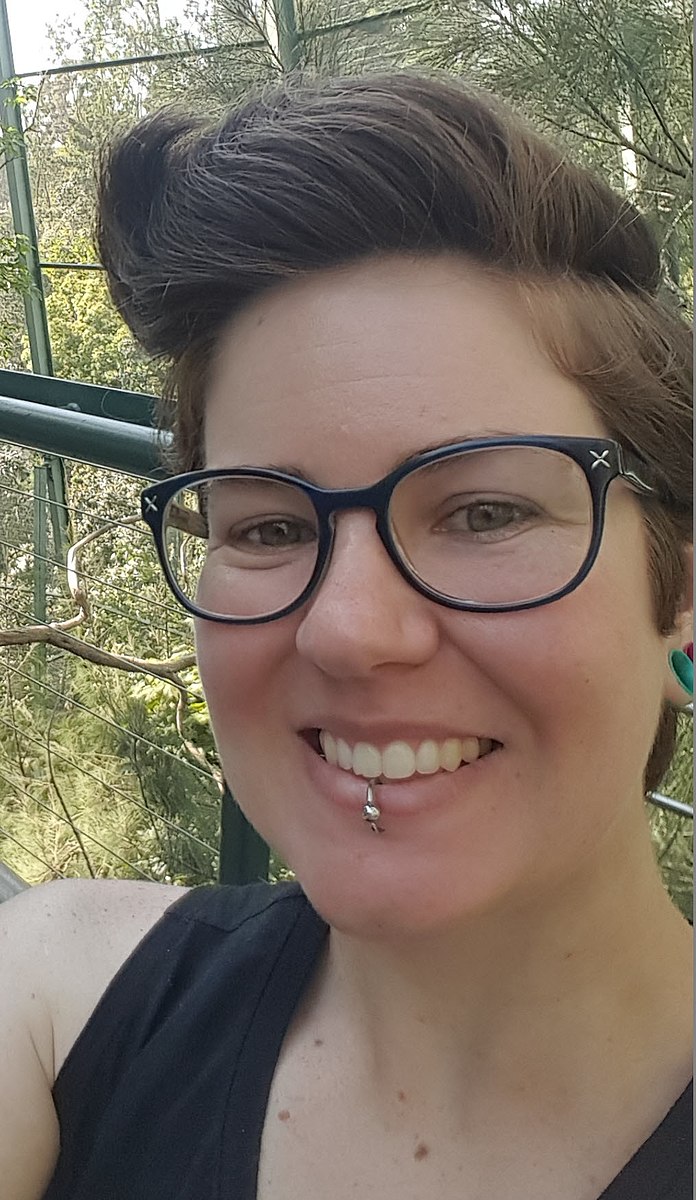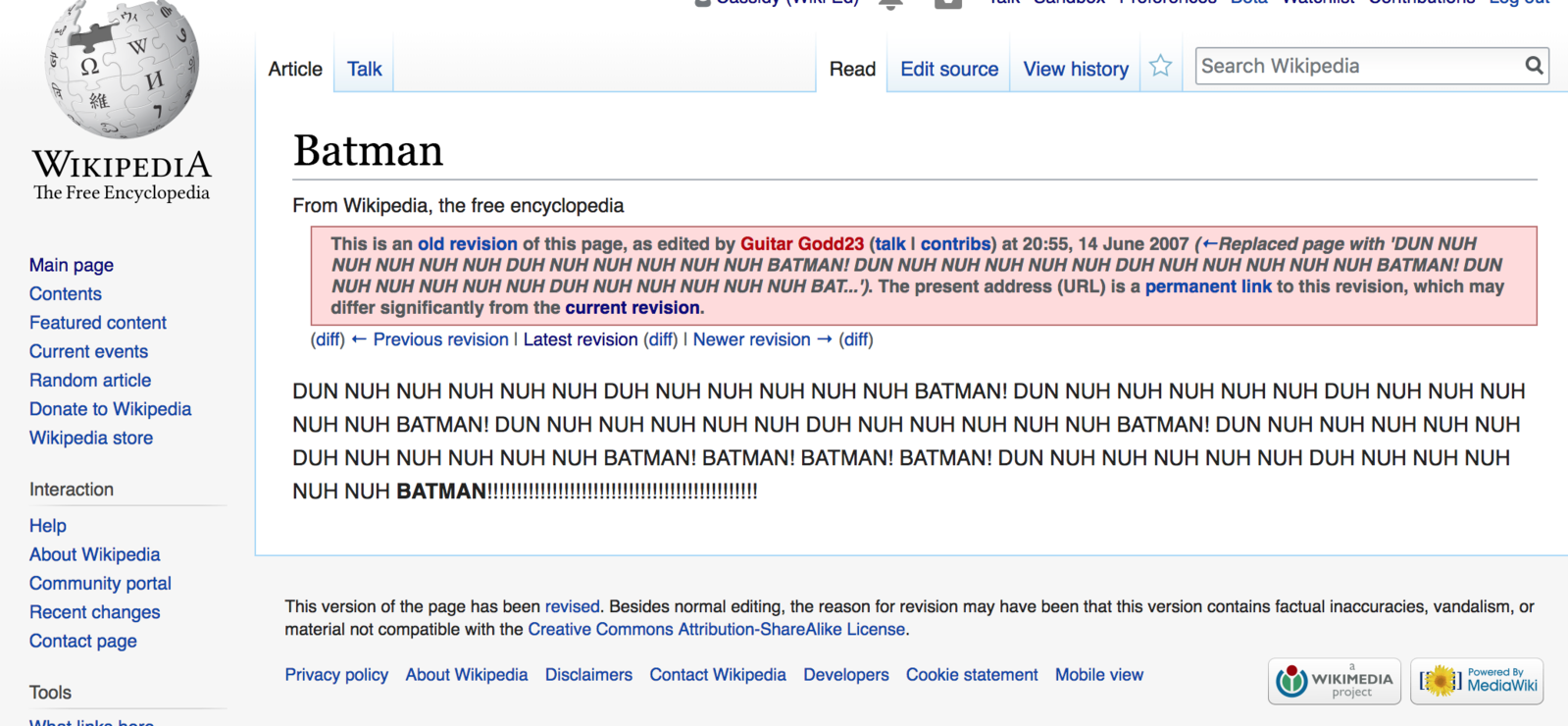Michelle Gohr is First Year Experience Librarian at Arizona State University. As a member of the National Women’s Studies Association, she participated in our recent Wikipedia Fellows pilot and now reflects on what this experience has meant to her.

Image: File:Michelle Gohr Headshot.jpg, Michelle Gohr, CC BY-SA 4.0, via Wikimedia Commons.
Going into the Wikipedia Fellows pilot program I was already a supporter and user of Wikipedia, both in my personal and even professional life, so getting to learn more about it in a safe and guided environment was an amazing experience. I don’t know why I’ve always looked on Wikipedia more favorably. I can’t say whether it’s because I’m a young academic who was exposed to a unique, quickly evolving information landscape, or if it’s a part of my personal style of information gathering; but I can say that where I once found myself to be in the minority regarding my opinions of Wikipedia and its use, I am now happy to find that a lot of my colleagues and students are coming around to the idea of using Wikipedia for education. In fact, some of my colleagues recently remarked how “cool” it was that I edit Wikipedia…it is cool.
Even as a librarian, while I was still in library school and in my early career there was very staunch pushback against using or teaching with Wikipedia in any capacity, and this seemed to be mirrored or even amplified within the academy. The insistence against using Wikipedia was so intense from some sectors that I would almost feel shame consulting Wikipedia if I didn’t know or understand a subject that I was assisting a student with. I legitimately believed that information had to be found in a very specific way using specific tools that were approved by “experts” for that information to be considered “legitimate”. I also believed that because I read and consulted Wikipedia frequently I was unintelligent, lazy, and not worthy of academia. Whether this was a product of my own misunderstanding, or if that was the intended response, a message got through to me nonetheless and I have a feeling that a similar message may still be sent to undergraduates now. Feeling shame and guilt about learning or seeking out new information is the last thing we should want any person to feel.
Reflecting back on the anxiety I felt as an undergraduate when searching for information has been invaluable in shaping my teaching philosophy, my practice as a librarian, and my interest in participating in this pilot (10/10, would pilot again). As a radical librarian and academic, in my personal practice I don’t feel that it’s enough to teach students how to research in those acceptable ways established by the academy. I don’t think it’s enough to simply tell them to only ever use databases for research, and not explain what they are, where they come from, and why we use them. Being radical means teaching critical information literacy. It means helping others question authority and examine who has historically produced, consumed (or who was allowed to consume), and controlled knowledge. It means calling out and taking to task capitalist valuation of knowledge and its subsequent commodification. It also means equipping learners with tools that help them understand how to evaluate information sources, search for information creatively and safely, and produce new information, even when doing something as simple as reading a Wikipedia article or Googling a question. Wikipedia itself warns against using articles as citations in research papers, and understandably so, Wikipedia is a tertiary source. Wikipedia is a starting point, not an ending point, but it’s even more than that. It is a tool for teaching students about the information gathering process including seeking out background information, citing sources, evaluating information, synthesizing information, and producing new knowledge.
We’re academics, we understand or at least feel the ramifications of our current model for scholarly publication and knowledge production. We at least have an idea of who controls the information, where it goes, who gets access, and who benefits and gets paid for the work at the end of the day. But we still teach students to function in a system that has a problematic history while simultaneously condemning the use of tools that may have the potential to disrupt it. But make no mistake, Wikipedians are still predominantly white and male which engenders various biases and structural inequalities in rules and content of the platform and articles themselves. So a lot of the errors we see within Wikipedia are reflections of much larger, systematic issues, the same issues that are also often seen in academia. So while Wikipedia is not a perfect resource, it does have enormous potential, and we absolutely have the power to begin changing it.
By understanding the Wikipedia back end and skills needed to edit, academics and educators have the potential to make critical changes. Not only can we enrich the content within Wikipedia itself, but we can use it as a powerful tool for teaching through a learning community. Through the lens of an academic and librarian, this to me is the true power of Wikipedia and academic involvement in it. Because anyone can edit, we can disrupt knowledge gatekeeping and production which has, for a long time, privileged and primarily reflected white, wealthy, cis, hetero, male thought and histories. We can reconstruct and re-contextualize authority and decolonize knowledge systems by incorporating strong feminist and indigenous epistemologies, and we can do this by participating. While we do this, our students will be watching, reading, and maybe even participating themselves, and we’ll know that the content they’re getting is (or can be with some help and edits) well rounded, representative, and maybe even radically transforming.
I can’t even begin to relate how truly excited I am about this change in opinion surrounding Wikipedia’s use and the potential for democratization of knowledge. As a librarian, I believe deeply in free, open, and equal access to all information, including but especially the vast amount of information behind cost prohibitive paywalls that we as academics often take for granted. I believe that the inaccuracies, as hilarious as they sometimes are, within Wikipedia are a small price for providing what is in essence open access to education.
We have the power as academics to make huge contributions to knowledge available to the public through Wikipedia, and being able to participate in this pilot just cemented my already mildly anarchistic feelings about the potentiality within Wikipedia.
To learn more about how you can get involved as a Wikipedia Fellow, visit fellows.wikiedu.org. To read more testimonials from Wikipedia Fellows alumni, click here.


Love, love, love this post.
Amazing! Love it!!! AGREE!